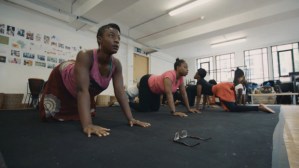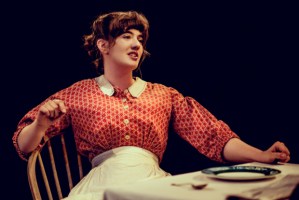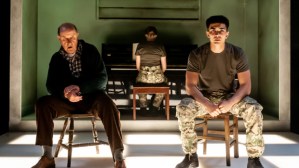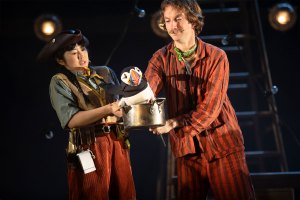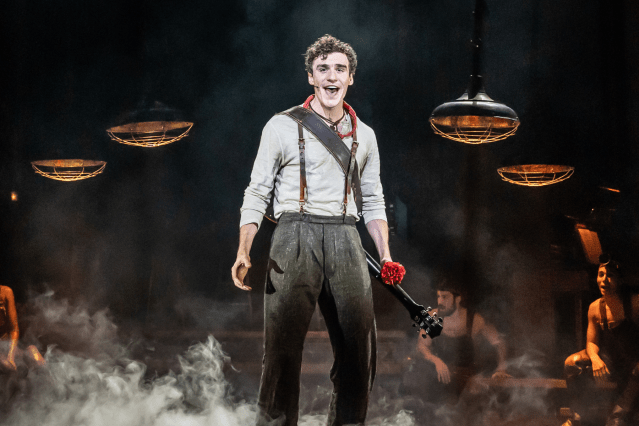Review: The Secret Lives of Baba Segi's Wives (Arcola Theatre)
Lola Shoneyin’s 2010 novel ”The Secret Lives of Baba Segi’s Wives” comes to the stage
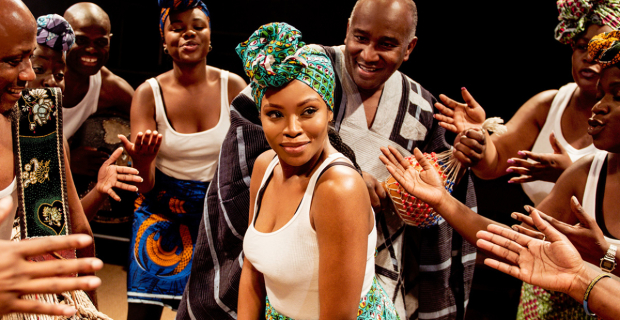
© Idil Sukan
Baba Segi thinks he has it all – four wives, a house chock full of riches and a clan of loving children excitedly bustling around. He's the dignified, cheeky patriarch at the head of a burgeoning present-day Nigerian household – one he hopes to expand with the help of newest wife Bolanle. Though, in Rotimi Babatunde's adaptation of Lola Shoneyin's award-winning novel, even the most chipper domestic life can come toppling down in the most unpredictable ways.
Director Femi Elufowoju Jr conjures a vibrant, musical, lyrical production in the larger space at the Arcola, staged in the round with minimal props. It gives the show a communal, riotous feeling, aided by some superb musical accompaniment from the cast – characters emerge from the audience, lounging on sofas and chat with their spectators.
Patrice Naiambana's Baba Segi draws out the laughs with the simplest of smiles, bouncing between charismatic patriarch and overbearing traditionalist. Everything is worn on the sleeve – jubilation, self consciousness and eventual humiliation. He's helped by some precise characterisation from each wife – Jumoké Fashola, Christina Oshunniyi, Layo-Christina Akinlude and Marcy Dolapo Oni – each stealing moments and providing the emotional heartbeat of the play.
Shola Ajayi's costume work is sublime – every member of Baba Segi's household dressed uniformly in unique, bold patterns. It creates a neat paradox – these women all donning the same clothing in a man's household, yet still being able to retain a unique sense of identity. Naiambana wears giant billowing blue fabrics, occupying an immense amount of space, forever unavoidable. Choreography from Kemi Durosinmi and Uche Onah gives the show a spiralling and fluid sense of storytelling, simultaneously charming while never more than a single step from anger or tragedy.
Tradition and innovation rest side by side – superstitions and science rubbing shoulders. Baba Segi's inability to comprehend the word "coitus" is, while rib-tickling, telling to the extreme. Sex for this man is a routine, procreation a simple assumption. Medicine doesn't come into it, and technical terminology is alien. But as the patriarchal foundations of his existence slowly slide away, the fragility of convention is exposed for all – as for many men, his house is only as strong as his seed.
The streak of gender commentary that pulses through the piece makes it pertinent and timely – themes of abortion, sexual violence, childraising and the place of the wife ("inmates", as Bolanle describes them) in the family structure are all swiftly and thoroughly dismantled. Though Babatunde's analysis of contemporary polygamy feel hurried away in closing monologues by Naiambana and Dolapo Oni, ("a man must be prepared", Baba Segi wistfully decides), it's hard to deny that the show feels fresh, entertaining and exuberant.


